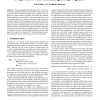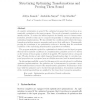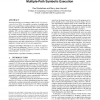590 search results - page 82 / 118 » Non-Failure Analysis for Logic Programs |
ICLP
2005
Springer
14 years 2 months ago
2005
Springer
Any finite tree automaton (or regular type) can be used to construct act interpretation of a logic program, by first determinising and completing the automaton to get a pre-inter...
ECAI
2010
Springer
13 years 10 months ago
2010
Springer
Abstract. The agent programming language GOLOG and the underlying Situation Calculus have become popular means for the modelling and control of autonomous agents such as mobile rob...
ENTCS
2007
13 years 8 months ago
2007
A compiler optimization is sound if the optimized program that it produces is semantically equivalent to the input program. The proofs of semantic equivalence are usually tedious....
WCRE
2010
IEEE
13 years 7 months ago
2010
IEEE
—An important application of binary-level reverse engineering is in reconstructing the internal logic of computer malware. Most malware code is distributed in encrypted (or “pa...
ISSTA
2010
ACM
13 years 10 months ago
2010
ACM
This paper presents a new technique, called Symbolic Program Decomposition (or SPD), for symbolic execution of multiple paths that is more scalable than existing techniques, which...



